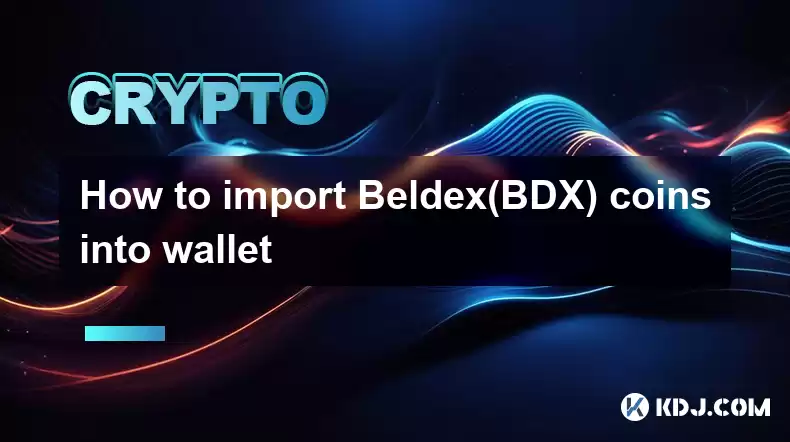-
 Bitcoin
Bitcoin $115000
0.12% -
 Ethereum
Ethereum $3701
4.50% -
 XRP
XRP $3.081
2.99% -
 Tether USDt
Tether USDt $0.0000
-0.01% -
 BNB
BNB $767.9
1.45% -
 Solana
Solana $169.5
3.13% -
 USDC
USDC $0.9999
0.01% -
 Dogecoin
Dogecoin $0.2106
4.30% -
 TRON
TRON $0.3334
1.62% -
 Cardano
Cardano $0.7564
2.54% -
 Stellar
Stellar $0.4165
0.76% -
 Hyperliquid
Hyperliquid $38.75
0.25% -
 Sui
Sui $3.593
3.00% -
 Chainlink
Chainlink $17.08
3.59% -
 Bitcoin Cash
Bitcoin Cash $573.6
4.35% -
 Hedera
Hedera $0.2508
-0.84% -
 Avalanche
Avalanche $23.07
6.46% -
 Ethena USDe
Ethena USDe $1.001
-0.02% -
 Litecoin
Litecoin $120.8
8.17% -
 UNUS SED LEO
UNUS SED LEO $8.943
-0.32% -
 Toncoin
Toncoin $3.400
-5.60% -
 Shiba Inu
Shiba Inu $0.00001255
1.54% -
 Uniswap
Uniswap $9.908
6.32% -
 Polkadot
Polkadot $3.718
2.10% -
 Monero
Monero $303.0
-0.74% -
 Dai
Dai $0.9999
-0.02% -
 Bitget Token
Bitget Token $4.392
0.91% -
 Cronos
Cronos $0.1403
6.31% -
 Pepe
Pepe $0.00001076
1.13% -
 Aave
Aave $267.2
1.80%
How to import Beldex(BDX) coins into wallet
By choosing a suitable wallet, creating a secure backup, and understanding the processes for transferring and receiving Beldex (BDX) coins, users can effectively store, manage, and transact with their BDX assets securely.
Jan 02, 2025 at 03:56 pm

How to Import Beldex (BDX) Coins into Wallet: A Comprehensive Guide
This detailed guide provides a comprehensive walkthrough of importing Beldex (BDX) coins into a compatible wallet. Whether you're a seasoned cryptocurrency enthusiast or a newcomer to the Beldex ecosystem, this article will empower you with the knowledge and steps to securely store and manage your BDX coins.
Key Points
- Choosing the Right Wallet: Opting for a wallet that supports Beldex (BDX) is crucial.
- Making a Beldex (BDX) Wallet Backup: safeguarding your wallet and its contents against potential losses.
- Transferring Beldex (BDX) from an Exchange to a Wallet: Moving your BDX from an exchange to a secure wallet for long-term storage.
- Sending and Receiving Beldex (BDX): Understanding the process of transacting with BDX coins.
- Advanced Beldex (BDX) Wallet Features: Exploring the security enhancements and additional features offered by advanced wallets.
Step-by-Step Guide to Importing Beldex (BDX) Coins into Wallet
1. Choosing the Right Wallet
Selecting a suitable wallet for Beldex (BDX) is paramount. The most commonly recommended types of wallets include:
- Hardware Wallets: Trezor and Ledger are popular hardware wallets that provide cold storage for Beldex (BDX), offering enhanced security against online threats.
- Desktop Wallets: Coinomi and Exodus are known for their user-friendly interfaces and support for multiple cryptocurrencies, including Beldex (BDX).
- Mobile Wallets: Trust Wallet and Atomic Wallet are available on iOS and Android platforms, providing convenient mobile access to Beldex (BDX).
2. Making a Beldex (BDX) Wallet Backup
Creating a secure backup of your Beldex (BDX) wallet is essential for safeguarding your funds. Here's how to back up your wallet using a hardware wallet or a software wallet:
- Hardware Wallets: Follow the manufacturer's instructions for creating a recovery seed, which serves as a backup for restoring your wallet and its contents if necessary.
- Software Wallets: Generally, software wallets provide a backup option within the application. Choose a secure password and generate a backup file that can be stored offline for added security.
3. Transferring Beldex (BDX) from an Exchange to a Wallet
To transfer Beldex (BDX) from an exchange to your chosen wallet, follow these steps:
- Create a Beldex (BDX) wallet address within your wallet application.
- Navigate to the Beldex (BDX) withdrawal page on the exchange.
- Enter the recipient wallet address and the amount of BDX you wish to withdraw.
- Confirm the transaction details and initiate the transfer.
4. Sending and Receiving Beldex (BDX)
Sending and receiving Beldex (BDX) coins involves similar processes:
- Sending: Open your Beldex (BDX) wallet, enter the recipient wallet address, the amount of BDX to send, and initiate the transaction.
- Receiving: Provide the sender with your Beldex (BDX) wallet address. Once the sender confirms the transaction, the BDX will be deposited into your wallet.
5. Advanced Beldex (BDX) Wallet Features
Advanced Beldex (BDX) wallets offer additional features that enhance security and usability:
- Multi-Signature: This feature requires multiple parties to sign off on a transaction, increasing security by preventing unauthorized access.
- BIP39 Recovery Phrase: A mnemonic phrase that allows for recovering your wallet even if you lose access to the device or file where the wallet was originally stored.
FAQs
Q. What is the difference between a hardware wallet and a software wallet?
A. Hardware wallets offer enhanced security by storing private keys offline, while software wallets are convenient for everyday transactions but may be susceptible to online threats.
Q. How do I restore my Beldex (BDX) wallet from a backup?
A. The recovery process varies depending on the wallet type. For hardware wallets, use the recovery seed. For software wallets, import the backup file generated during the backup process.
Q. Can I store other cryptocurrencies in my Beldex (BDX) wallet?
A. Some wallets support multiple cryptocurrencies, including Beldex (BDX). Check the wallet's specifications to determine its capabilities.
Q. What security measures should I take to protect my Beldex (BDX) coins?
A. Always use strong passwords, enable two-factor authentication, store your private keys securely, and keep your software up to date to mitigate potential security risks.
Q. How long does it take to transfer Beldex (BDX) coins?
A. Transfer times can vary depending on network conditions and the wallet you are using. However, transactions typically take a few minutes to an hour to complete.
Disclaimer:info@kdj.com
The information provided is not trading advice. kdj.com does not assume any responsibility for any investments made based on the information provided in this article. Cryptocurrencies are highly volatile and it is highly recommended that you invest with caution after thorough research!
If you believe that the content used on this website infringes your copyright, please contact us immediately (info@kdj.com) and we will delete it promptly.
- Velo Universe, DEX, and DeFi Security: Navigating the Future of Decentralized Trading
- 2025-08-05 09:25:13
- Bitget Wallet Revolutionizes Solana with Gas-Free Transactions: A New Era for DeFi
- 2025-08-05 09:25:13
- Ozak AI, Crypto Boom, and ROI Potential: Is This the Next Big Thing?
- 2025-08-05 09:25:24
- Solana's ETF Hopes & the All-Time High Chase: Is SOL Set to Soar?
- 2025-08-05 09:25:24
- Coinbase's Brian Armstrong and the Art of Focused Work: A Deep Dive
- 2025-08-05 09:25:30
- Uniswap Price Prediction: Bullish Reversal on the Horizon?
- 2025-08-05 09:25:30
Related knowledge

What is Chainlink (LINK)?
Jul 22,2025 at 02:14am
Understanding Chainlink (LINK): The Decentralized Oracle NetworkChainlink is a decentralized oracle network designed to bridge the gap between blockch...

What is Avalanche (AVAX)?
Jul 22,2025 at 08:35am
What is Avalanche (AVAX)?Avalanche (AVAX) is a decentralized, open-source blockchain platform designed to support high-performance decentralized appli...

What is Polkadot (DOT)?
Jul 19,2025 at 06:35pm
Understanding the Basics of Polkadot (DOT)Polkadot (DOT) is a multi-chain network protocol designed to enable different blockchains to transfer messag...

What is Litecoin (LTC)?
Jul 23,2025 at 11:35am
Overview of Litecoin (LTC)Litecoin (LTC) is a peer-to-peer cryptocurrency that was created in 2011 by Charlie Lee, a former Google engineer. It is oft...

What is Monero (XMR)?
Jul 21,2025 at 10:07am
What is Monero (XMR)?Monero (XMR) is a decentralized cryptocurrency designed to provide enhanced privacy and anonymity for its users. Unlike Bitcoin a...

How to add indicators to Ethereum chart on TradingView?
Jul 19,2025 at 07:15am
What Is an Ethereum Chart on TradingView?The Ethereum chart on TradingView is a visual representation of the price movement of Ethereum (ETH) over a s...

What is Chainlink (LINK)?
Jul 22,2025 at 02:14am
Understanding Chainlink (LINK): The Decentralized Oracle NetworkChainlink is a decentralized oracle network designed to bridge the gap between blockch...

What is Avalanche (AVAX)?
Jul 22,2025 at 08:35am
What is Avalanche (AVAX)?Avalanche (AVAX) is a decentralized, open-source blockchain platform designed to support high-performance decentralized appli...

What is Polkadot (DOT)?
Jul 19,2025 at 06:35pm
Understanding the Basics of Polkadot (DOT)Polkadot (DOT) is a multi-chain network protocol designed to enable different blockchains to transfer messag...

What is Litecoin (LTC)?
Jul 23,2025 at 11:35am
Overview of Litecoin (LTC)Litecoin (LTC) is a peer-to-peer cryptocurrency that was created in 2011 by Charlie Lee, a former Google engineer. It is oft...

What is Monero (XMR)?
Jul 21,2025 at 10:07am
What is Monero (XMR)?Monero (XMR) is a decentralized cryptocurrency designed to provide enhanced privacy and anonymity for its users. Unlike Bitcoin a...

How to add indicators to Ethereum chart on TradingView?
Jul 19,2025 at 07:15am
What Is an Ethereum Chart on TradingView?The Ethereum chart on TradingView is a visual representation of the price movement of Ethereum (ETH) over a s...
See all articles

























































































